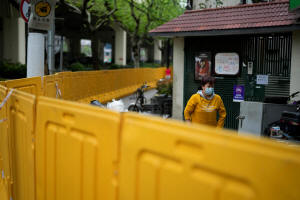Growing defiance of COVID curbs in China brings wave of arrests
 Send a link to a friend
Send a link to a friend
 [April 15, 2022]
By Eduardo Baptista [April 15, 2022]
By Eduardo Baptista
BEIJING (Reuters) - Sun Jian, a 37-year-old
master's degree student in the Chinese city of Yantai, for months staged
a solo campaign against his university's COVID-19 prevention measures,
including blistering criticism on social media.
The last straw for authorities came on March 27, when Sun walked around
his campus carrying a placard that read "lift the lockdown on Ludong".
Police detained him and on April 1 Ludong University expelled him,
according to a letter from the university seen by Reuters.
University officials did not respond to a request for comment.
The Chinese public have been largely supportive of the zero-COVID policy
that kept the coronavirus at bay for the two years after it emerged in
the central city of Wuhan in late 2019 and spread rapidly around the
world.
But the support seems to be wearing thin as the highly contagious
Omicron variant emerges in China, triggering curbs that have brought
food shortages, family separations, lost wages and economic pain.

Sun's protest reflects growing frustration and resentment, in a society
that generally respects authority, with a COVID strategy that is
increasingly challenged by the Omicron variant.
In some cases the push-back has gone viral on social media, with video
clips of citizens scuffling with health workers and screaming anger over
lockdowns from the windows of their apartments.
Space for dissent has narrowed as China has grown more authoritarian
under President Xi Jinping, and the anger over COVID restrictions has
created headaches for authorities who have urged the public to make
sacrifices for the greater good.
Sun said his university had moved classes online and banned students
from leaving campus, receiving packages or getting outside food
deliveries.
He dismissed the curbs as unnecessary given what he said was the low
death rates associated with the Omicron variant.
"The trouble brought by the virus can't be compared with the disruption
from some of the anti-COVID measures taken by our school," Sun told
Reuters by telephone.
He said his social media accounts had been blocked.
'VENTING OFF'
Arrests and detentions for COVID-related rule-breaking surged in March,
according to the results of a search on the Weibo social media platform
for police statements, posts by state agencies and state media reports
from around China.

[to top of second column]
|

A resident is seen behind barriers sealing off an area under
lockdown amid the coronavirus disease (COVID-19) pandemic, in
Shanghai, China April 14, 2022. REUTERS/Aly Song
 The search found 59 confirmed police
cases and 26 arrests for COVID rule-breaking in January, and fewer
in February. But in March, more than 600 police cases and 150
confirmed arrests were reported on Weibo, the review by Reuters
found.
It is likely that the figures represent only a
fraction of actual cases as not every incident makes it to social
media or is reported by the authorities.
Public security departments also announced a surge in crackdowns on
COVID rule violations in March, with cities and counties publishing
80 notices on their Weibo accounts, compared with seven in January
and 10 in February.
Most infractions involve citizens trying to skirt rules such as
reporting travels on a health app, falsifying COVID test results,
and sneaking out of locked-down neighbourhoods.
Assaults on health workers also surged.
Police also reported arrests of citizens who were “venting off
dissatisfaction” and using “inappropriate language” related to the
pandemic.
As the resentment simmers, authorities are trying to control the
public message, often with censorship of online complaints.
On April 5, videos of a protest against lockdowns in Langfang, a
city near Beijing, were quickly removed from Weibo.
Last week, Shanghai announced a crackdown on "rumours", threatening
to shut down offending social media chat groups.

But pushback from the public can yield results.
Last month, students at Sichuan University in the city of Chengdu
forced university authorities to lift a campus lockdown after
protesting, the South China Morning Post reported.
State media warnings have at times added fuel to the fire.
Thousands of social media posts used a Weibo hashtag for a report by
the official Xinhua news agency about police cracking down on COVID-related
misinformation to post criticism of the government's coronavirus
response.
By Friday, it had racked-up over half a billion views.
(Reporting by Eduardo Baptista; Editing by Tony Munroe, Robert
Birsel)
[© 2022 Thomson Reuters. All rights
reserved.] This material may not be published,
broadcast, rewritten or redistributed.
Thompson Reuters is solely responsible for this content. |